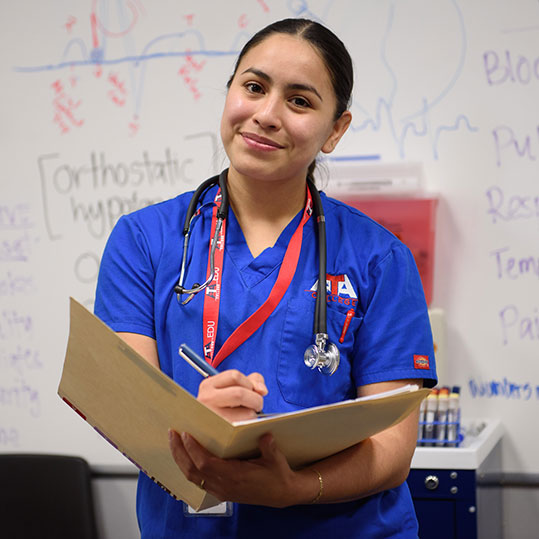Certifications in any industry are the key to getting the best jobs. Certifications demonstrate knowledge, commitment, and the proven skills employers want in their staff. Medical assistants can work without a certificate, but being a Nationally Certified Medical Assistant (NCMA) qualifies candidates for better positions. Are you asking yourself, “Can you get certified without a diploma?”
Can You Take the NCMA Exam Without Going to School?
The National Center for Competency Testing (NCCT), one of the nation’s premier credentialing agencies, allows candidates with a high school diploma and two years of recent experience to take their test. Still applicants are few and far between because few people can meet those criteria. Qualifications among other agencies vary.
What Certifications Can Medical Assistants Get?
Medical assistants can obtain several certifications. Each is slightly different but requires passing a competency exam. The most widely recognized are:
National Certified Medical Assistant (NCMA)
Offered by the National Center for Competency Testing (NCCT), the NCMA is among the most sought-after certifications. Their qualification criteria are robust. Requirements include:
- A high school or general equivalency diploma
- Two years of supervised, full-time experience as a medical assistant in the last 60 months
- Graduates of an accredited medical assistant program within the last five years
Registered Medical Assistant (RMA)
Conferred by American Medical Technologists, qualifications for this certification are:
- Graduation from a medical assisting program approved by the US Department of Education, the Council for Higher Education Accreditation, or by the AMT Board of Directors within the last 48 months.
- Graduation from a military medical assisting program in the last four years
- A high school diploma plus CPR certification and three years of relevant experience in the last five years.
Certified Medical Assistant (CMA)
Founded in 1956, the American Association of Medical Assistants (AAMA) is the premier professional organization for medical assistants. Their mission is to improve the field and set educational standards for future students, so it’s no surprise their certification criteria is the most stringent of all agencies, requiring a vocational school diploma or an associate’s degree from programs accredited by the Accrediting Bureau of Health Education Schools (ABHES) or the Commission on Accreditation of Allied Health Education Programs (CAAHEP).
Nationally Registered Certified Medical Assistant (NRCMA)
Offered by the National Association for Health Professionals, the NRCMA credential is a good choice for students who have:
- Completed a US Department of Education-accredited medical assisting program
- Two years of experience in a credential-related medical field
- Two years of applicable medical training in the Armed Forces
How Does Certification Help a Medical Assistant’s Career?
Medical assistants with credentials have a leg up on the competition, allowing them to be seen by employers during the hiring process. Certification also:
Helps Build Confidence
Certification helps medical assistants gain the confidence it takes to be successful. Vocational school diploma programs teach to the test, covering the areas exams evaluate in-depth. For new graduates, knowing they’ve passed the exam helps validate their skills. Certified Medical Assistants are better prepared to hit the ground running because they’re confident in their skills.
Demonstrates Your Competency
Healthcare is a strictly regulated field. Employers are responsible for their medical assistants’ job performance, so they prefer trained candidates with proven skills. In a competitive field, certification demonstrates competency without experience. It sparkles on a resume.
Makes You a More Valuable Hire
Medicare, the nation’s largest insurer, requires medical assistants to be certified before performing high-risk tasks. Certified medical assistants are more versatile, and therefore more valuable to prospective employers.
Boost Your Professional Growth
Vocational school graduates have all the skills they need to handle entry-level positions. But certification gives hiring managers confidence that new medical assistants can tackle broader responsibilities with less supervision. Certified applicants may qualify for positions diploma-only candidates will struggle to get because they’re a better investment for most employers.
General certification is also a must for getting specialty certificates. If you enjoy a particular type of medical practice, you can obtain additional certifications in cardiology, geriatrics, urology, or one of the other specialties. Every credential earned speaks to your expertise and strengthens you as a job applicant.
Demonstrates a Strong Commitment
Healthcare evolves quickly, and medical assistants need to keep pace; cutting-edge treatments and technological advances are around every corner.
But since all certifications require continuing education credits to maintain, certified medical assistants demonstrate their willingness to stay on top of developments in their field. It’s the type of dedication and commitment to learning what employers are looking for.
Future-Proofs Your Career
Competency-based hiring is trending in healthcare. How does that impact the next generation of medical assistants? It means that employers are increasingly demanding objective proof of applicants’ skills. Getting a vocational school diploma is a good first step, but certification suggests graduates can work safely and effectively. A diploma may be all a medical assistant needs today, but certification is a good investment for the future.
What Do You Learn in a Medical Assistant Program?
Vocational school diploma programs prepare students for entry-level positions and certification. The curriculum includes materials covered in the test, such as:
Medical Terminology
The healthcare field has a unique language, but words are simple to decipher once you understand their parts. Medical terminology courses teach students to determine what terms mean, not by memorization, but by analyzing their prefixes, suffixes, and roots. As a result graduates will feel comfortable researching information in patients’ charts without needing a dictionary.
Anatomy and Physiology
Anatomy is how the body is constructed, while physiology is how it functions. As clinical support professionals, medical assistants need a basic understanding to manage patients’ needs. Anatomy and physiology courses cover the fourteen body systems, the most common medical disorders, and their treatment.
Pharmacology
Pharmacology is the study of drugs and their therapeutic effects. You’ll learn about the different categories of medications, their benefits and side effects, and how to help patients use them safely.
Medical Law and Ethics
As responsible employees, medical assistants should be familiar with health regulations and the ethical dilemmas they may encounter in practice. This course helps medical assistants work safely and confidently.
Office Procedures
Geared for students with no experience, medical assisting programs cover general office procedures, including data entry, faxing, filing, correspondence, electronic communication, and customer care.
Medical Coding
Medical coding is alphanumeric shorthand used on insurance forms to describe health symptoms and disorders plus medical diagnostics, services, and supplies. It’s a vital part of a medical assistant’s job and requires pinpoint accuracy because it drives reimbursement.
The Benefits of Enrolling in a Medical Assisting Program
Qualifying for certification is a major benefit of attending a vocational school medical assistant program. Here are a few more that are too good to ignore:
Quick, Efficient Training Programs
Most jobs in the medical field require years in school to train for, but students attending full-time can earn a diploma in as little as eight months. It’s a practical way for adults with responsibilities at home to further their education without being out of work indefinitely.
Flexible Class Schedules
Vocational schools understand their students’ busy schedules. While attending classes full-time is the shortest path to the finish line, part-time or hybrid learning programs are convenient options for adults juggling responsibilities. Why delay pursuing your career goals when you have options?
Small Class Sizes
Whether you’re a high school graduate or an adult changing careers, small class sizes mean a more comfortable, stress-free learning environment. The relaxed pace gives instructors more time to spend with each student.
Comprehensive Learning
Vocational schools provide the same quality education as colleges, but in less time because programs are focused on practical skills, there are no general electives. Instead, you will practice tasks using the same equipment found in healthcare settings. Nothing will seem new or unusual when you start your first job.
Most programs also offer externships, off-campus opportunities to work alongside experienced medical assistants, watching how they interact with patients and structure their day. By the time graduation day comes, you’ll feel like a full-fledged medical assistant.
Job Placement Benefits
Demand for medical assistants is growing, so finding employment isn’t tough for vocational school graduates. But finding the perfect position can be more challenging; however, many job openings are never shared publicly. Instead, doctors save money and time by tapping vocational schools for well-qualified applicants. As a student, you’ll be in the right place at the right time.
Career counselors do an excellent job matching graduates with compatible employers. So why spend weeks searching online job boards when you can have an expert working on your behalf?
Final Thoughts
The US needs more medical assistants to meet the needs of an aging population. But healthcare is a dynamic industry, and employers need a trained team with skills they can count on. Don’t be left behind. Being certified as a medical assistant could be the difference between being employed and landing the dream job you deserve in a competitive world.
Medical Assistant Diploma
The Medical Assistant program is designed to teach you the administrative and clinical skills necessary to work in both back and front office settings of a doctor’s office or similar setting.
After completing the diploma program at this El Cajon | San Diego Medical Assistant School, you have the option to continue in the Medical Assistant, Associate of Applied Science program. The associate degree can be completed in an additional 6 months and contains general education courses, along with advanced medical assisting courses and classes in electrocardiography and phlebotomy.
Contact us today to learn more about medical assisting career opportunities offered at ATA College.





